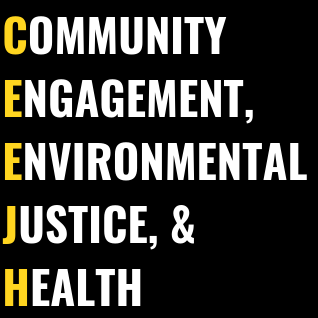Trump Administration’s Environmental Justice Rollbacks Undermine Decades of Progress for Vulnerable Communities, Dr. Sacoby Wilson Warns
Dr. Sacoby M. Wilson
At the Center for Engagement, Environmental Justice, and Health, Inc. (CEEJH), we believe that communities hold collective power and knowledge within themselves, centering around self-determination. The whirlwind of anti-environmental justice (EJ) executive orders signed by the Trump administration presents a significant challenge. These actions undermine the progress that has been made to ensure that all communities, particularly those historically burdened by pollution, have access to a healthy environment and are not disproportionately impacted by environmental harm. Despite these setbacks, our mission to support impacted communities is unwavering. We understand that EJ is not just about addressing environmental degradation, but also about standing up for the human right to live in safe, clean, and sustainable environments. Guided by the 17 Principles of Environmental Justice and the Jemez Principles for Democratic Organizing, we actively work to dismantle systems of oppression and foster just, equitable, and thriving communities. The recent executive orders may attempt to roll back regulations, de-prioritize equity considerations, and limit the ability of communities to challenge harmful projects; however, our work remains unchanged as we will continue to INpower those who are most affected by these policies. Dr. Sacoby M. Wilson, Director of CEEJH states: “I think it is a slap in the face to many communities affected by environmental injustice because it says, ‘We do not care about you.”
Here’s how CEEJH will continue to drive change:
1. Advocacy and Policy Engagement: We believe there is still room at the state and local levels to push forward policies that protect vulnerable communities. We will work with policymakers to strengthen local environmental regulations, support community-driven initiatives, and ensure that all residents have a voice in decisions that affect their well-being.
2. Education and INpowerment: We use “INpowerment” intentionally to refer to the power residents have within themselves, rather than relying on external forces. We will help communities better understand how they can advocate for themselves. We will offer resources on how to access information, navigate environmental laws, and participate in decision-making processes—whether through public comment periods, local council meetings, or organizing for collective action. We provide technical assistance to allow community members to become community scientists, further cementing the idea that you do not need a PhD or college degree to be impactful in the EJ movement.
3. Collaboration with Allies: The EJ movement has always thrived on collective action and solidarity. We will strengthen our collaboration with like-minded organizations (Mid-Atlantic Justice Coalition), grassroots groups (South Baltimore Community Land Trust), public health experts, and legal advocates. Together, we can amplify the voices of impacted communities and find innovative ways to continue pushing for environmental protections, even when faced with policy rollbacks.
5. Building Resilience: At its core, CEEJH is about building resilient communities that are not merely surviving, but thriving. In the face of these political challenges, we will focus on supporting communities in building their own resilience to environmental hazards. This includes advocating for investment in green infrastructure, renewable energy, sustainable development, and community-led climate adaptation strategies.
6. Highlighting the Human Impact: While political and policy decisions may come from the top down, our work remains deeply rooted in the lived experiences of the people most affected by environmental degradation. We remain dedicated to amplifying community voices, and to holding the government accountable for the real-world impacts of environmental neglect. By highlighting and humanizing the consequences of these executive orders, we can continue to push for the policy changes that are so desperately needed.
While these anti-EJ executive orders represent a significant step backward in the fight against environmental racism and for equitable environmental protection, we remain steadfast in our mission. The EJ movement has always been about challenging entrenched power structures, advocating for marginalized voices, and ensuring that every community, regardless of race or income, has the right to a healthy, safe environment. Even in the face of these regressive political challenges, CEEJH’s work will continue to uplift communities, fight for stronger protections, and champion a healthy future grounded in justice, equity, and sustainability. EJ is deeply intertwined with social justice, making it impossible to achieve without addressing the critical social issues that impact communities across America. Dr. Martin Luther King, Jr. is considered by many EJ scholars and advocates to be the grandfather of the movement, whose incredibly brave work created a path for the trailblazers of today. These leaders inspire the next generations of advocates and scholars, and we cannot allow the recent regressive executive orders to undermine the hard-won progress made to advance justice and equity.
